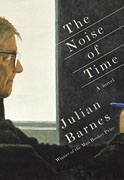The Noise of Time
Julian Barnes
book reviews:
· general fiction
· chick lit/romance
· sci-fi/fantasy
· graphic novels
· nonfiction
· audio books
· author interviews
· children's books @
curledupkids.com
· DVD reviews @
curledupdvd.com
newsletter
win books
buy online
links
home
for authors
& publishers
for reviewers

 |
The Noise of Time Julian Barnes Knopf Hardcover 224 pages May 2016 |
|
In The Noise of Time
Through Dmitri’s eyes, Barnes attempts to portray the unforgiving nature of the Soviet regime, a system that ramps up the fear for “those who survive and remain.” Dmitri’s complicated connection to the Communist Party is a delicate balancing act, as Stalin himself later comes to have a closeted and unrequited appreciation for the great composer. Every night Dmitri thinks about the past as he stands and waits, fearing for the future, smoking his way through “the brief present.” Hoping to assuage his nocturnal vigils, Dmitri begins work on a symphony dedicated to the memory of Lenin even as he anxiously waits for “the Power” to resume its conversation with him. Beautifully written by Barnes, whose stream-of consciousness prose communicates so much of Dmitri Shostakovish’s complicated internal life, the composer emerges here as an omnipresent and tragic prodigy. The author unveils a complex portrait of a brilliant artist and nonconformist who advocated “free love” yet was always constrained by the Communist Party’s vision of art and music and culture. In 1940, Dmitri receives the Red Banner of labor, a reward for his film music even after his own compositions are banned. For the Soviets, cinema was considered a much greater use and value to the people than Dmitri’s atonal operas. Condemned as “formalism” and much like Tchaikovsky’s imperil compositions, Dmitri’s work was considered incompatible with the newly harsh and strict Soviet standards. In 1948, Dmitri travels with a cultural delegation to New York. With his reputation on the line, Dmitri is well aware that he is expected to do more than be a reluctant bystander in a landscape that has “communists at the one end and capitalists at the other” with himself “somewhere in the middle.” Dmitri is determined not to become a member of the party, a regime which he sees as composed of “musical bureaucrats” intent on peddling fake optimism while maintaining that art must belong to the people, as Lenin had decreed. The novel moves organically through the various peaks and valleys of Shostakovich’s life. Barnes uses Dmitri’s voice to present his major theme: the power and fragility of the creative impulse, how vital and irrepressible it is, and how devastating the loss of this impulse can be. Although familiarity with Shostakovich’s music makes the novel more accessible, most readers will still be able to appreciate how the cogs in the machinery of Soviet life at first hinder and then hijack every artistic move this truly talented composer tries to make. There’s history here and something personal, a grudge and age-old bitterness. Perhaps the greatest insult is at the end of the novel when the Party--under the new leadership of Nikita Khrushchev--attempts to finally hug Dmitri to its bosom. Happier times might have come, and Stalin’s nights of terror might eventually be acknowledged, yet Dmitri holds tight to the notion that he cannot join what he sees as a duplicitous and hypocritical party which for years has attempted to ban his music. Dmitri Shostakovish’s fractured images certainly make the struggle to maintain his musicality all the more poignant in a landscape where art is a whisper heard above the noise of time. The novel has a sense of inevitability as we march through the ages and into the shadows of Dmitri Shostakovich’s later life, from where he looks back on his creativity and his despair, his love for his family and his desire to be loved, and to his own fragile and unrequited sense of hopelessness in the face of his great musical genius. Originally published on Curled Up With A Good Book at www.curledup.com. © Michael Leonard, 2016 |
| Also by Julian Barnes: |
|
|
|
 Click here to learn more about this month's sponsor! |
|
| fiction · sf/f · comic books · nonfiction · audio newsletter · free book contest · buy books online review index · links · · authors & publishers reviewers |
|
| site by ELBO Computing Resources, Inc. | |
 Barnes’ initial focus is on Dmitri’s early years, from his intensely emotional, over-protective mother, to his marriage to Nita, to 1936 and his constant fear of being hauled off in the middle of the night by the NKVD men. This fear of interrogation--and possible death--leaves Dmitri barely sleeping. With his suitcase packed, Dmitri frantically chain-smokes as he awaits his fate by the elevator of “The Big House,” a foreboding place where traitors are either shot outright or hauled off, never to be seen by their families again. A pivotal scene is when Dmitri is questioned about his activities at
the home of Marshal Tukhachevsky. Interrogating him about his music and his politics, the Soviet authorities try to implicate Dmitri in Tukhachevsky’s conspiracy to assassinate Stalin.
Barnes’ initial focus is on Dmitri’s early years, from his intensely emotional, over-protective mother, to his marriage to Nita, to 1936 and his constant fear of being hauled off in the middle of the night by the NKVD men. This fear of interrogation--and possible death--leaves Dmitri barely sleeping. With his suitcase packed, Dmitri frantically chain-smokes as he awaits his fate by the elevator of “The Big House,” a foreboding place where traitors are either shot outright or hauled off, never to be seen by their families again. A pivotal scene is when Dmitri is questioned about his activities at
the home of Marshal Tukhachevsky. Interrogating him about his music and his politics, the Soviet authorities try to implicate Dmitri in Tukhachevsky’s conspiracy to assassinate Stalin.